牛津译林版(2019)选择性必修一课件 U2 The Universal Language L6 Extended reading 课件(18张ppt)
文档属性
| 名称 | 牛津译林版(2019)选择性必修一课件 U2 The Universal Language L6 Extended reading 课件(18张ppt) |  | |
| 格式 | pptx | ||
| 文件大小 | 4.0MB | ||
| 资源类型 | 教案 | ||
| 版本资源 | 牛津译林版(2019) | ||
| 科目 | 英语 | ||
| 更新时间 | 2022-12-28 17:26:38 | ||
图片预览

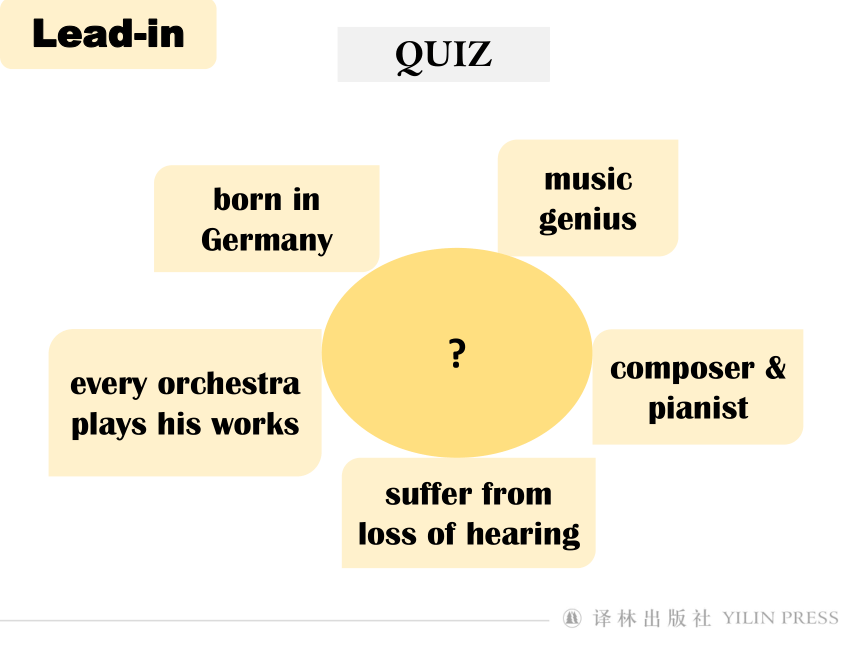
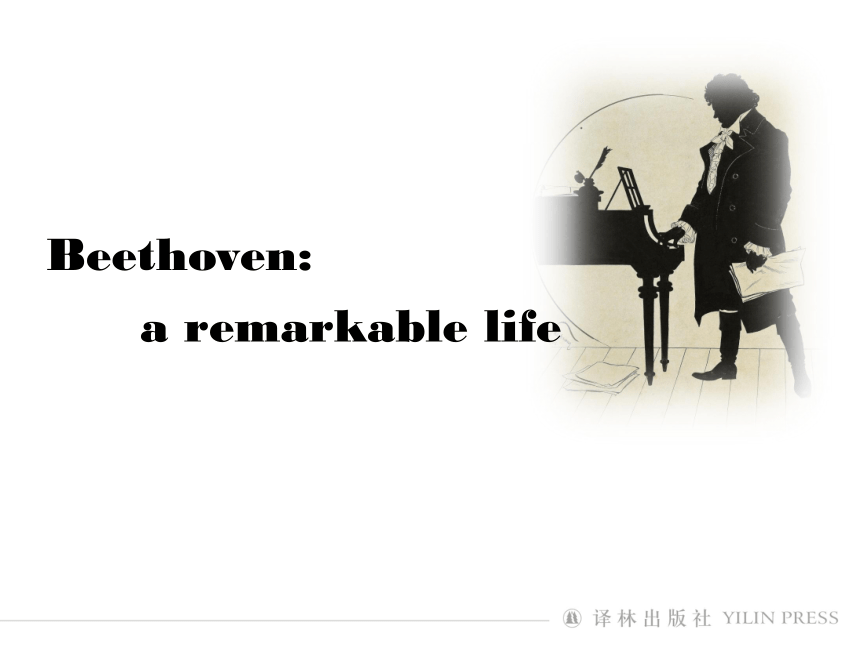
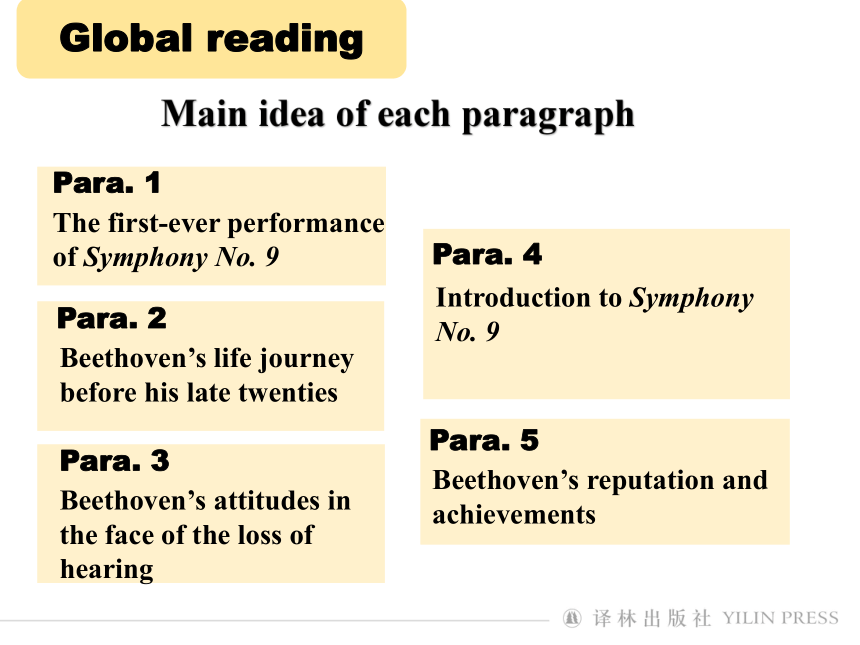
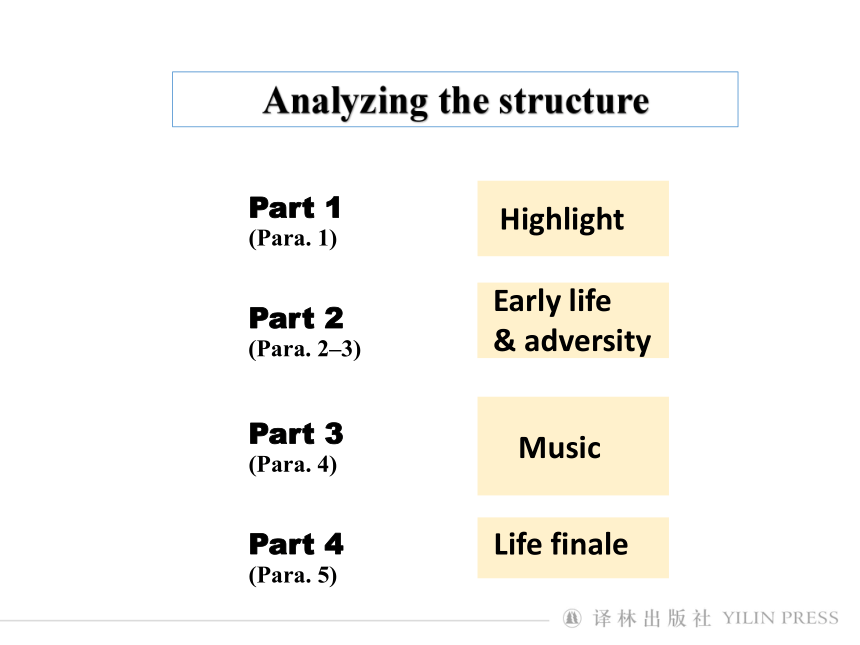
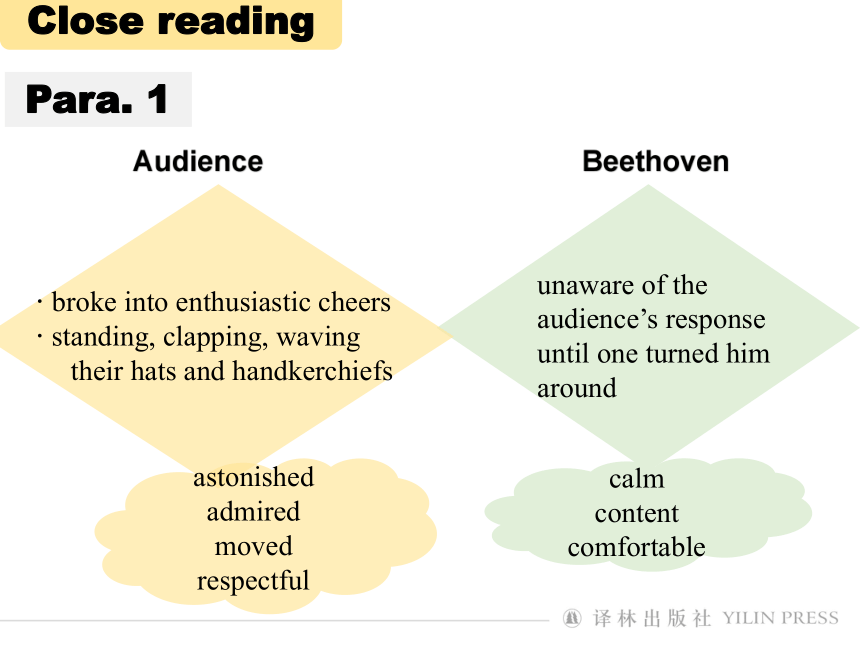
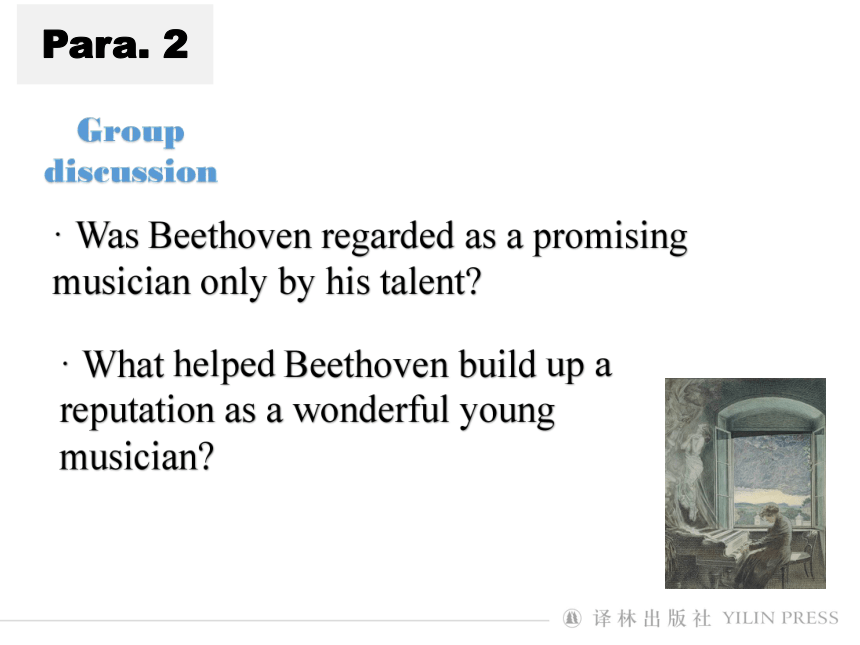
文档简介
(共18张PPT)
Unit 2 The universal language
Extended reading
born in Germany
every orchestra plays his works
composer & pianist
music genius
suffer from loss of hearing
Lead-in
QUIZ
Beethoven:
a remarkable life
Main idea of each paragraph
Para. 1
Para. 2
Para. 3
Para. 4
Para. 5
The first-ever performance
of Symphony No. 9
Beethoven’s life journey before his late twenties
Beethoven’s attitudes in
the face of the loss of
hearing
Introduction to Symphony No. 9
Beethoven’s reputation and achievements
Global reading
Life finale
Music
Highlight
Early life
& adversity
Analyzing the structure
Part 1
(Para. 1)
Part 2
(Para. 2–3)
Part 3
(Para. 4)
Part 4
(Para. 5)
Para. 1
Audience
Beethoven
Close reading
· broke into enthusiastic cheers
· standing, clapping, waving
their hats and handkerchiefs
unaware of the
audience’s response
until one turned him
around
astonished
admired
moved
respectful
calm
content
comfortable
Para. 2
· What helped Beethoven build up a
reputation as a wonderful young
musician
· Was Beethoven regarded as a promising musician only by his talent
Group
discussion
(1)What did Beethoven do to overcome the loss of hearing in paragraph 3
Para. 3
share with his brother in secret
reduce performances
seek for different ways to continue composing music
return to stage with Symphony No. 9
(2)What personality did Beethoven show during his struggle against the fate
diligence
optimism
persistence
dedication
fearlessness
...
1 Since that day, Beethoven’s Symphony No. 9 has become one of the most famous and treasured pieces in the history of classical music. 2 The first movement starts quietly, but all of a sudden the whole orchestra breaks into an energetic theme. 3 You can soon feel the determination—a quality Beethoven understood well because of his hearing difficulties— coursing through the music. 4 The next two movements are full of desperate lows and uplifting highs which perhaps reflect both his suffering and his strong will to fight it. 5 The music moves through technically difficult sections with ease, showing his genius as a composer. 6 Finally, in the fourth movement, he connects all of the different variations into a joyful chorus.
Para. 4
S2
S1
S4
S5
S3
S6
TS
SS1
SS2
DS1
DS2
SS3
Para. 5
Why is Beethoven regarded as one of the most remarkable musicians in history
Critical thinking
The string of the passage
On 7 May 1824, a crowd of music lovers streamed into a theatre in Vienna to hear ... Beethoven’s Symphony No. 9 (Para. 1)
Symphony No. 9 was Beethoven’s last major piece of music in ... (Para. 2)
When Beethoven presented Symphony No. 9 in Vienna in 1824, it was his first time ... (Para. 3)
Since that day, Beethoven’s Symphony No. 9 has become one of the most famous and treasured pieces ... (Para. 4)
As Beethoven’s last great work, his Symphony No. 9 was also a grand finale to his life ... (Para. 5)
Symphony No. 9
⑤
③
①
④
②
Symphony No. 9
Why does the author choose
Symphony No. 9 as the string of the whole passage
●Symphony No.9 is regarded as Beethoven’s greatest work. “Ode to Joy” is sung during the final movement of the symphony. Beethoven is the musician who lost hearing but brought joy to the world.
●The desperate lows and uplifting highs of the symphony perfectly indicate twists and turns of the musician’s life.
Para. 1
Para. 2
Para. 3
Para. 4
Appreciation
Flashback
Life and work
Para. 5
Highlight
To arouse interest
To create twists
To avoid stereotype
...
Homework
1. Suppose your friend Li Lei is suffering from depression and feeling ashamed of his terrible condition. Use what you’ve learned from the story of Beethoven and write a letter to comfort him.
2. Explore the Internet and find more about Beethoven and his works.
Dear Li Lei,
Thank you for your trust. I’m sorry to hear about your current situation. Actually, life can be tough sometimes, and anybody can hardly avoid stress and negative feelings, including you and me.
I’d like to share with you a story of Beethoven I recently read. As a musician, he suffered from the loss of hearing most of his life. At the beginning, he found it hard to admit his problem and kept it a secret. But later, he wrote to his brother and sought for effective ways to live a life full of music. With great determination during the darkest time, he composed the well-known symphonies, such as No. 5 “Fate”, and No. 9 “Ode to Joy”. I strongly recommend you to listen to his symphonies, in which you can feel twists and turns of life and perseverance of the musician.
If you’d like to have a chat, don’t hesitate to contact me. Hope you’ll feel better and we’ll appreciate Beethoven’s symphonies together.
Yours faithfully
Li Hua
One possible version
Unit 2 The universal language
Extended reading
born in Germany
every orchestra plays his works
composer & pianist
music genius
suffer from loss of hearing
Lead-in
QUIZ
Beethoven:
a remarkable life
Main idea of each paragraph
Para. 1
Para. 2
Para. 3
Para. 4
Para. 5
The first-ever performance
of Symphony No. 9
Beethoven’s life journey before his late twenties
Beethoven’s attitudes in
the face of the loss of
hearing
Introduction to Symphony No. 9
Beethoven’s reputation and achievements
Global reading
Life finale
Music
Highlight
Early life
& adversity
Analyzing the structure
Part 1
(Para. 1)
Part 2
(Para. 2–3)
Part 3
(Para. 4)
Part 4
(Para. 5)
Para. 1
Audience
Beethoven
Close reading
· broke into enthusiastic cheers
· standing, clapping, waving
their hats and handkerchiefs
unaware of the
audience’s response
until one turned him
around
astonished
admired
moved
respectful
calm
content
comfortable
Para. 2
· What helped Beethoven build up a
reputation as a wonderful young
musician
· Was Beethoven regarded as a promising musician only by his talent
Group
discussion
(1)What did Beethoven do to overcome the loss of hearing in paragraph 3
Para. 3
share with his brother in secret
reduce performances
seek for different ways to continue composing music
return to stage with Symphony No. 9
(2)What personality did Beethoven show during his struggle against the fate
diligence
optimism
persistence
dedication
fearlessness
...
1 Since that day, Beethoven’s Symphony No. 9 has become one of the most famous and treasured pieces in the history of classical music. 2 The first movement starts quietly, but all of a sudden the whole orchestra breaks into an energetic theme. 3 You can soon feel the determination—a quality Beethoven understood well because of his hearing difficulties— coursing through the music. 4 The next two movements are full of desperate lows and uplifting highs which perhaps reflect both his suffering and his strong will to fight it. 5 The music moves through technically difficult sections with ease, showing his genius as a composer. 6 Finally, in the fourth movement, he connects all of the different variations into a joyful chorus.
Para. 4
S2
S1
S4
S5
S3
S6
TS
SS1
SS2
DS1
DS2
SS3
Para. 5
Why is Beethoven regarded as one of the most remarkable musicians in history
Critical thinking
The string of the passage
On 7 May 1824, a crowd of music lovers streamed into a theatre in Vienna to hear ... Beethoven’s Symphony No. 9 (Para. 1)
Symphony No. 9 was Beethoven’s last major piece of music in ... (Para. 2)
When Beethoven presented Symphony No. 9 in Vienna in 1824, it was his first time ... (Para. 3)
Since that day, Beethoven’s Symphony No. 9 has become one of the most famous and treasured pieces ... (Para. 4)
As Beethoven’s last great work, his Symphony No. 9 was also a grand finale to his life ... (Para. 5)
Symphony No. 9
⑤
③
①
④
②
Symphony No. 9
Why does the author choose
Symphony No. 9 as the string of the whole passage
●Symphony No.9 is regarded as Beethoven’s greatest work. “Ode to Joy” is sung during the final movement of the symphony. Beethoven is the musician who lost hearing but brought joy to the world.
●The desperate lows and uplifting highs of the symphony perfectly indicate twists and turns of the musician’s life.
Para. 1
Para. 2
Para. 3
Para. 4
Appreciation
Flashback
Life and work
Para. 5
Highlight
To arouse interest
To create twists
To avoid stereotype
...
Homework
1. Suppose your friend Li Lei is suffering from depression and feeling ashamed of his terrible condition. Use what you’ve learned from the story of Beethoven and write a letter to comfort him.
2. Explore the Internet and find more about Beethoven and his works.
Dear Li Lei,
Thank you for your trust. I’m sorry to hear about your current situation. Actually, life can be tough sometimes, and anybody can hardly avoid stress and negative feelings, including you and me.
I’d like to share with you a story of Beethoven I recently read. As a musician, he suffered from the loss of hearing most of his life. At the beginning, he found it hard to admit his problem and kept it a secret. But later, he wrote to his brother and sought for effective ways to live a life full of music. With great determination during the darkest time, he composed the well-known symphonies, such as No. 5 “Fate”, and No. 9 “Ode to Joy”. I strongly recommend you to listen to his symphonies, in which you can feel twists and turns of life and perseverance of the musician.
If you’d like to have a chat, don’t hesitate to contact me. Hope you’ll feel better and we’ll appreciate Beethoven’s symphonies together.
Yours faithfully
Li Hua
One possible version
同课章节目录
- Unit 1 Food matters
- Welcome to the unit
- Reading
- Grammar and usage
- Integrated skills
- Extended reading
- Project
- Unit 2 The Universal Language
- Welcome to the unit
- Reading
- Grammar and usage
- Integrated skills
- Extended reading
- Project
- Unit 3 The art of painting
- Welcome to the unit
- Reading
- Grammar and usage
- Integrated skills
- Extended reading
- Project
- Unit 4 Exploring poetry
- Welcome to the unit
- Reading
- Grammar and usage
- Integrated skills
- Extended reading
- Project
